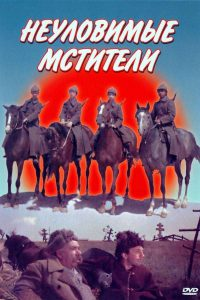 THE ELUSIVE AVENGERS (1967) – This movie is often classified as part of the subgenre called “Easterns/ Osterns” – counterparts of Westerns. As an example of global cinema, The Elusive Avengers is worth a watch maybe once in a lifetime, but the cringe factor is heavy as it romanticizes four young guerilla fighters during the Russian Civil War.
THE ELUSIVE AVENGERS (1967) – This movie is often classified as part of the subgenre called “Easterns/ Osterns” – counterparts of Westerns. As an example of global cinema, The Elusive Avengers is worth a watch maybe once in a lifetime, but the cringe factor is heavy as it romanticizes four young guerilla fighters during the Russian Civil War.
The film is based on the 1921 novel Little Red Devils aka Red Devils aka The Hunt for Blue Fox. A 1923 silent movie version was made long before this definitive 1967 adaptation for the big screen. It goes without saying that the story was used as propaganda by Communist tyrants (and just like I never hesitate to say “Nazi tyrants” or “Nazi filth” I’m never going to hesitate to say “Communist tyrants” or “Communist filth”).
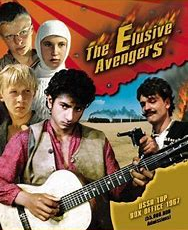 Judged purely on its production values and competent direction, The Elusive Avengers fascinates as much as it repels. In a world where a piece of garbage like deranged war criminal Vlad Putin runs Russia it can make a film like this a challenge to sit through without the real world intruding on one’s thoughts, but again, for anyone interested in world cinema history the movie is a revelation.
Judged purely on its production values and competent direction, The Elusive Avengers fascinates as much as it repels. In a world where a piece of garbage like deranged war criminal Vlad Putin runs Russia it can make a film like this a challenge to sit through without the real world intruding on one’s thoughts, but again, for anyone interested in world cinema history the movie is a revelation.
With all that said, I will point out that, ironically, The Elusive Avengers is nowhere near as extreme as a lot of Soviet-era cinema. Oddly enough for 1967, with the Cold War raging, the filmmakers were allowed to leave in a positive priest figure as well as conspicuous crucifixes being worn by some of the suffering background figures.
The story is set in 1920 and was written in 1921, before the Soviet government had successfully stamped out most religion, so leaving such elements in the movie was interesting faithfulness to the source material and time period. But rest assured the “heroic” depiction of Red Army figures will often remind viewers of the political intent behind The Elusive Avengers.
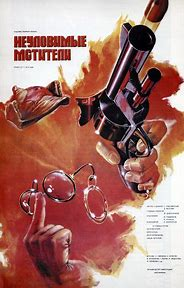 For a less than perfect comparison, think of old-fashioned Westerns which casually depict Native Americans as “the bad guys” without any deeper examination of the issues. Just as it does not mean a viewer hates Native Americans to watch such movies it does not mean a viewer sympathizes with the Leninists in this Russian film just because they watch it.
For a less than perfect comparison, think of old-fashioned Westerns which casually depict Native Americans as “the bad guys” without any deeper examination of the issues. Just as it does not mean a viewer hates Native Americans to watch such movies it does not mean a viewer sympathizes with the Leninists in this Russian film just because they watch it.
I wanted to get all that out of the way at the start, because from reading other reviews of The Elusive Avengers I gather it still rips open old wounds for people whose ancestors were on either side of the Russian Civil War.
THE STORY:
The Avengers/ Red Devils of the title are four young Russians who are among the countless orphans whose parents were killed in the ongoing war, either in battle or from the depredations of both armies or of bandit gangs.
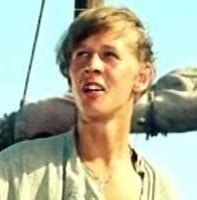 The countryside is already abuzz over the deeds of that group of roughly 13-year-old guerillas. (Remember Young Guns? Think of this foursome as REALLY Young Guns.) The leader is Danka (Viktor Kosykh), who, along with his teammate and sister Ksanka (Valentina Kurdyukova) saw their parents slain and their home burned down by rampaging White Russians.
The countryside is already abuzz over the deeds of that group of roughly 13-year-old guerillas. (Remember Young Guns? Think of this foursome as REALLY Young Guns.) The leader is Danka (Viktor Kosykh), who, along with his teammate and sister Ksanka (Valentina Kurdyukova) saw their parents slain and their home burned down by rampaging White Russians.
NOTE: For newbies to that time period, White Russians were pro-Tsarist while Red Russians were pro-Communist.
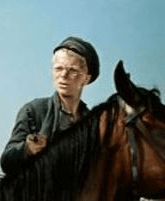 Another of the Avengers/ Red Devils is Valerka (Mikhail Metyolkin), a former prize student before the war disrupted his life. Valerka wears eyeglasses to remind us of how smart he is and wears a Cheka hat to remind us he’s on the side of the Reds.
Another of the Avengers/ Red Devils is Valerka (Mikhail Metyolkin), a former prize student before the war disrupted his life. Valerka wears eyeglasses to remind us of how smart he is and wears a Cheka hat to remind us he’s on the side of the Reds.
The fourth and most interesting member of the guerilla quartet is Yashka, a gypsy in this movie but a black person in the 1923 film version and a Chinese lad in the original novel. Yashka is played by Vasiliy Vasilev, who may be playing a gypsy here but whose dark skin will remind you that the character was black in the silent movie version.
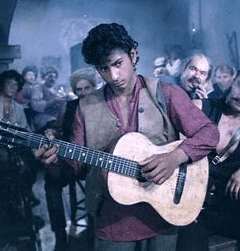 Yashka is skilled at dancing and guitar-playing as well as being the guerilla band’s expert at stealth. He may not be the leader of our heroes, but he steals the film with his performance and also gets a bit flirty with Ksanka.
Yashka is skilled at dancing and guitar-playing as well as being the guerilla band’s expert at stealth. He may not be the leader of our heroes, but he steals the film with his performance and also gets a bit flirty with Ksanka.
Their hardscrabble existence has toughened the four youngsters and made them experts at gunplay and unarmed combat. Their marksmanship is as incredible as any gunslinging hero in Westerns.
The first good deed that we viewers witness the team committing is the retrieval of a cow seized from a poor old woman who has nothing else. It is a troop of White Russians taking the woman’s possession and giving her nothing in exchange but empty words about a glorious future with cows galore for everyone if the Whites win the war.
The White Russians are depicted being as evil and lecherous as any outlaw gang in a Spaghetti Western. Sidor Lyuty (Vladimir Belokurov) is the most charismatic of the White Russian villains, and in a particularly slimy scene he hypocritically tells Danka that he truly feels sorry for children orphaned by the war but it is necessary to kill no-good Reds like Danka’s parents.
But getting back to the stolen cow, overnight the Avengers/ Red Devils steal it back for the poor old woman when low-ranking White Russians are traveling with it through a cemetery. The foursome – who communicate via impressions of cuckoos and roosters when in action – use theatrics to convince the superstitious low-level Whites that the cemetery is haunted and that ghosts stole the cow for themselves.
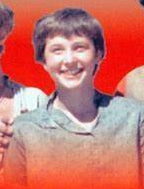 The stakes increase substantially from there, especially when Ksanka (at left) is nabbed by Lyuty and his men when she is surreptitiously hanging around a town trying to get a head-count of how many White soldiers are on hand.
The stakes increase substantially from there, especially when Ksanka (at left) is nabbed by Lyuty and his men when she is surreptitiously hanging around a town trying to get a head-count of how many White soldiers are on hand.
The cunning Lyuty uses the captured Ksanka as a serving girl at a tavern frequented by himself and his subordinates, simultaneously using her as bait to lure her three comrades into a rescue attempt so that all of them can be taken prisoner.
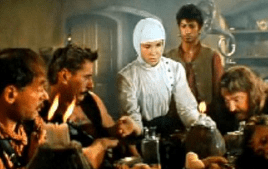 Yashka pretends to be a gypsy entertainer at the tavern, dancing and playing guitar for the amusement of the increasingly drunken Whites. He and Ksanka communicate via winks, setting up the moment when Danka and Valerka can be let in to help in slaughtering the intoxicated villains.
Yashka pretends to be a gypsy entertainer at the tavern, dancing and playing guitar for the amusement of the increasingly drunken Whites. He and Ksanka communicate via winks, setting up the moment when Danka and Valerka can be let in to help in slaughtering the intoxicated villains.
The bullets fly in this very effective scene, but we also have to endure some very silly comedy of the kind that afflicts a lot of lower tier Spaghetti Westerns.
At any rate, like a combination of the Wolverines from Red Dawn and the young gunslingers from Bad Kids of the West, our foursome continue their freewheeling activities. They soon ride their horses to attack and rob a horse-drawn carriage/ coach like robbing armed stagecoach passengers in a Western.
Among the dead is a young White Russian who was carrying with him a letter of introduction to the commander at his new duty station. Since that commander has never met the late White, Danka poses as the young man for infiltration purposes.
Thanks to Danka covertly relaying inside information to Yashka, Ksanka and Valerka, the young guerillas manage to spend the next two weeks striking at the villains. They ambush “Kosoi’s” troops and kill nearly all of them, warn a village in advance to hide all their grain before the Whites can plunder the town and take it for themselves, and kill off many of the horses of the White forces by slipping poison into their drinking water.
SPOILERS AHEAD:
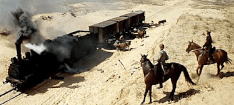 Danka is found out and the other three Avengers/ Red Devils mount a daring raid to rescue him. While on the run from the pursuing Whites who are furious about the successful rescue, our four heroes drive off a separate troop of Whites who are trying to rob a Red Army train loaded with supplies.
Danka is found out and the other three Avengers/ Red Devils mount a daring raid to rescue him. While on the run from the pursuing Whites who are furious about the successful rescue, our four heroes drive off a separate troop of Whites who are trying to rob a Red Army train loaded with supplies.
After driving off the villains, our main characters board the train themselves and get it running to complete the train’s delivery to the First Russian Cavalry. Now pursued by multiple groups of furious White Russians on horseback, the youngsters shoot it out with their foes in a scene reminiscent of countless “outlaws robbing a train” scenes from Westerns.
The Avengers/ Red Devils overcome all obstacles to get the supply train through to the Red Russians. In what is supposed to be a happy ending, the foursome are commended by the commander of the First Russian Cavalry for their careers as guerillas and for getting the supply train through.
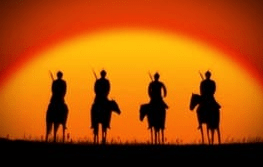 He also inducts the quartet (yes, Ksanka, too) into his cavalry unit and outfits them in official uniforms. As the film ends, the youngsters ride off into the sunset as the closing song tells viewers that the Avengers/ Red Devils stand ready to continue fighting for a Red Victory.
He also inducts the quartet (yes, Ksanka, too) into his cavalry unit and outfits them in official uniforms. As the film ends, the youngsters ride off into the sunset as the closing song tells viewers that the Avengers/ Red Devils stand ready to continue fighting for a Red Victory.
And did I say song? Yes, I did. There are a few songs scattered throughout the film, but it never becomes a musical. The songs are just part of the film’s soundtrack or are sung by characters as part of their in-story activities. For instance, some of the songs are performed by a few traveling entertainers led by Buba Kastorskiy (Boris Sichkin).
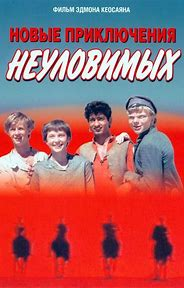 The 1967 Elusive Avengers movie was so popular in the Soviet Union that it was followed by two sequels, which reached increasing levels of cringe to the point where the four main characters are literally working for the Cheka (!) by the third and final film.
The 1967 Elusive Avengers movie was so popular in the Soviet Union that it was followed by two sequels, which reached increasing levels of cringe to the point where the four main characters are literally working for the Cheka (!) by the third and final film.
Boris Sichkin returned as Buba in the second movie, The New Adventures of the Elusive Avengers (1968) but was killed off. The conclusion of the trilogy came in 1971 with Once Again the Elusive Avengers aka The Crown of the Russian Empire. I may or may not review those, depending on reader reaction to this blog post.
FOR MY NON-FICTION LOOK AT AMERICAN TROOPS WHO SERVED IN RUSSIA FROM SEPTEMBER 1918 THROUGH JANUARY OF 1920, THUS GETTING CAUGHT UP IN THE RUSSIAN CIVIL WAR, CLICK HERE.

💜
Thank you!
Odd that a Priest and crosses should be left in. I think we know what they would do with them today. Like using a steamroller to get rid of everything that doesn’t fit their ideology.
Gwen.
Exactly! That really stood out to me.
Sounds like good movie! 👌
It certainly is powerful!
☺️
😀
Another excellent review. I haven’t heard of this film before but it definitely does sound intriguing. The concept behind the film reminds me of old-fashioned westerns made in the 1960’s. As I had already discussed before, I am a fan of westerns. “The Elusive Avengers” was very reminiscent of “Django Unchained”. Both films focus on a pair of scavengers travelling across the west in search for vengeance. The main difference is of course the filmmaker. Tarantino’s style of making a western is very unique.
Here’s why I loved “Django Unchained”:
Thank you. On my way to read your review of Django Unchained.